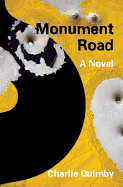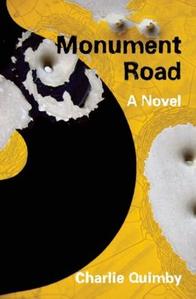

His beloved wife, Inetta, has died of cancer; she made him promise that, a year and a day after her cremation, he would take her ashes up to Artists Point, her favorite overlook, and scatter them to the wind. He is doing that today, and has decided to throw himself off with her.
For a year, he has been making arrangements for all he has left: the truck, the dog, the 260 acres of Colorado that he has known forever. Never a demonstrable man, to Inetta or anyone else, Leonard has become reclusive since her passing. Those who know him, however, have not forgotten him. They are vigilant and caring. When he drops off the dog with one of Inetta's friends, she becomes suspicious of his explanation of what he's up to.
In gorgeous prose, perfect for the mood of the story, Quimby takes us on this sad pilgrimage with Leonard. This is not Leonard reminiscing; he is not so inclined. It is Quimby, showing us all the lives that Leonard has touched.
Leonard and Inetta took in boys who needed a place to work and sort out what was next. Inetta's brother, Elliott, was one. After high school, he lived with them until he had enough money to go to California. Noticing he had been in a fight, Leonard pointed this out to Inetta. "He's been in a lot of fights," she said quietly. "And he always will. He's going to play too large for a small town." She left Leonard to figure out that enigmatic statement--and we find out much later what she meant.
Another young man they took in was Vaughn, a feckless but harmless alcoholic. About him and his blathering about "goals," Leonard thought to himself: "If you did your best and persevered, good things might happen, but goals were better left to kids playing games, where the baskets were nailed down and the posts were buried. In real life, things moved on you."
Junior Crimmins's stay with them ended badly, which set the stage for how his life went. Leonard tried to teach him about horses--and life: "A horse ain't that smart," he said, "but it's got a real good memory and it can learn. Trouble is, you train it wrong and it won't straighten itself out. Not like people do." As Quimby observes, it's a quintessential Leonard moment: "He'd come straight at you with something and then he'd park it sideways at the last minute so you could see it better."
By story's end, we see everything better and have come to care immensely about this taciturn, withdrawn man who has spent the past year trying to stave off "the darkening." Monument Road is so rich with landscape, character and event that such a small telling cannot begin to do it justice. Read this exquisite story; it is a joy and a wonder and a tour de force of authorship. --Valerie Ryan
Shelf Talker: A must-read for anyone interested in story, style and a big-hearted, even-handed tale of life.

